Module 4 Planes, ships and trains .Unit 1 He lives the farthest from school.课件(32张PPT)
文档属性
| 名称 | Module 4 Planes, ships and trains .Unit 1 He lives the farthest from school.课件(32张PPT) |
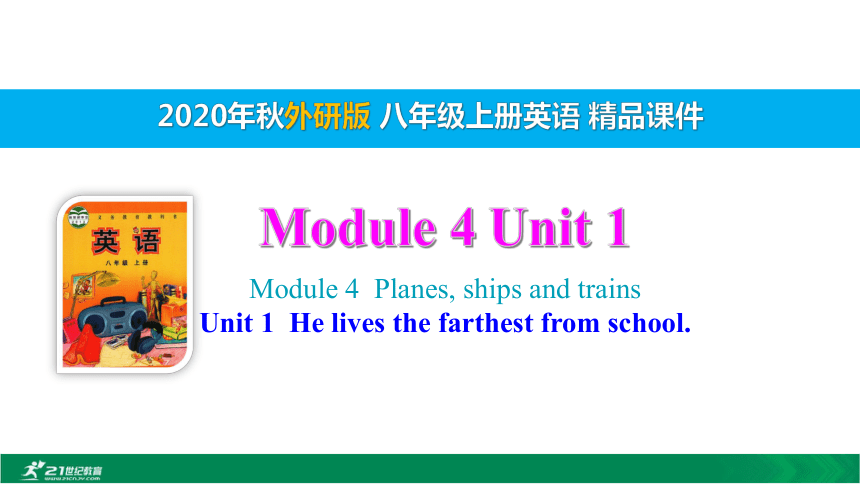
|
|
| 格式 | pptx | ||
| 文件大小 | 10.2MB | ||
| 资源类型 | 试卷 | ||
| 版本资源 | 外研版 | ||
| 科目 | 英语 | ||
| 更新时间 | 2020-08-12 07:30:36 | ||
图片预览

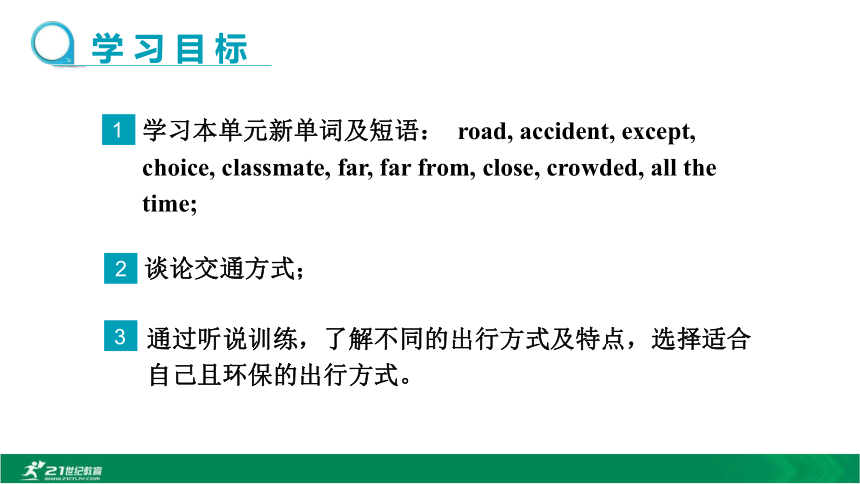
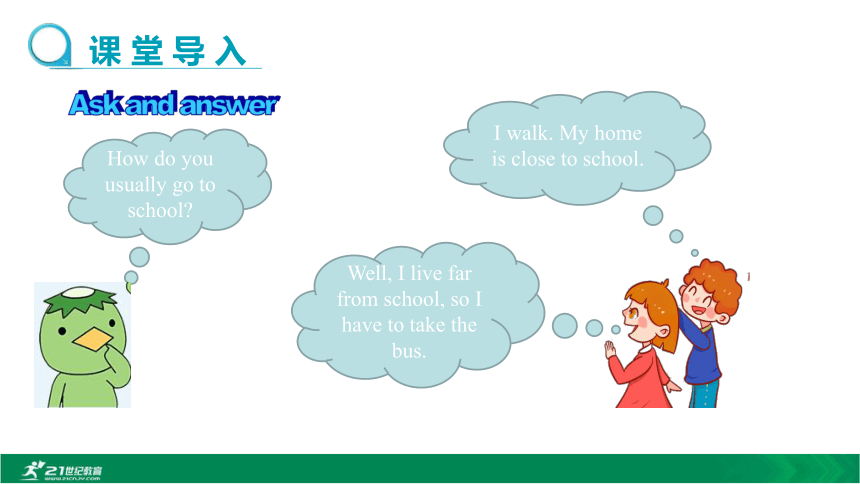
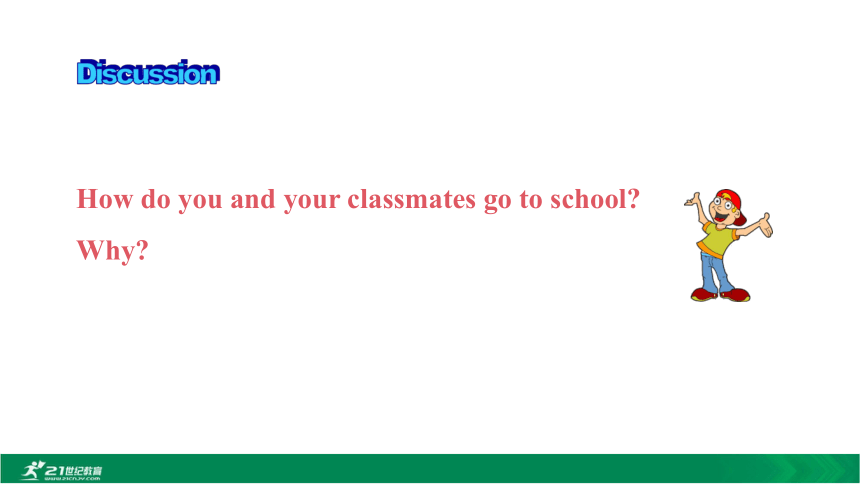
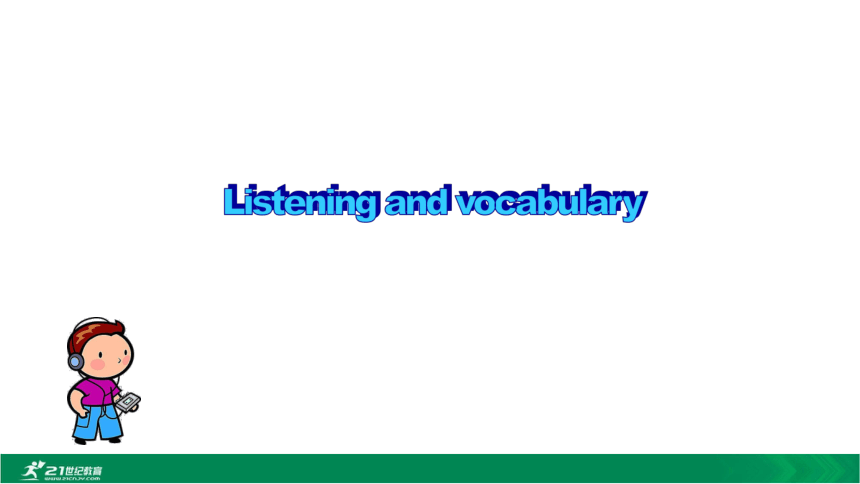
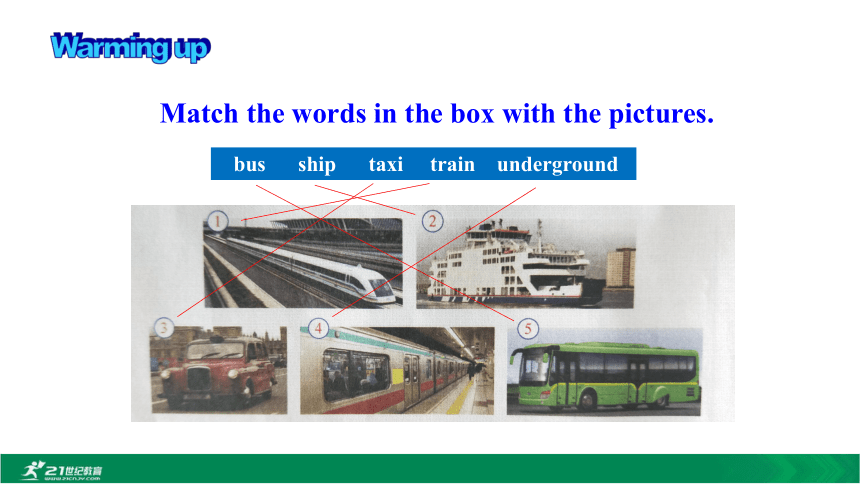
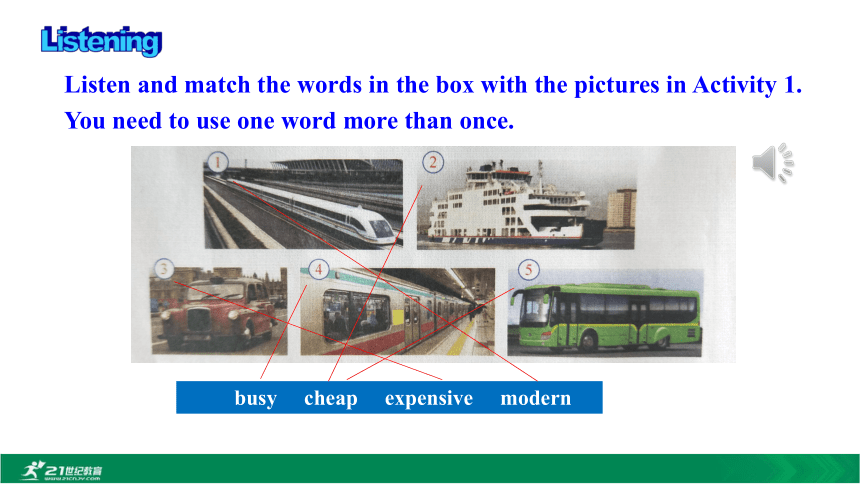

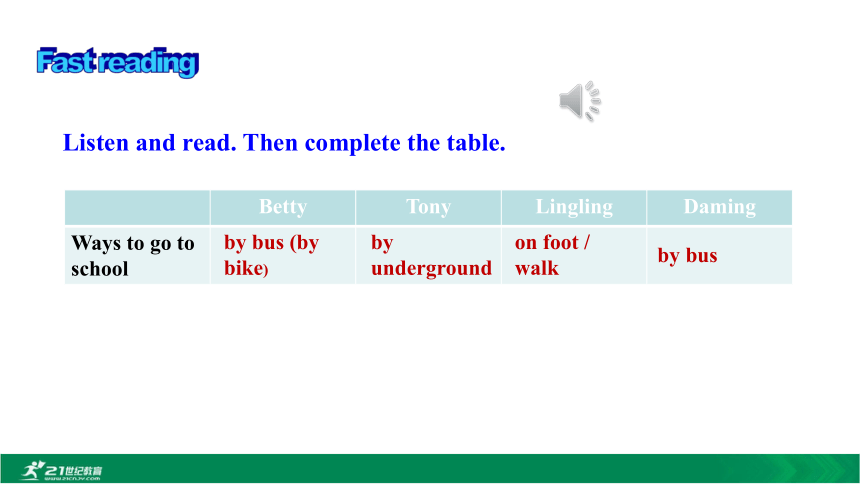
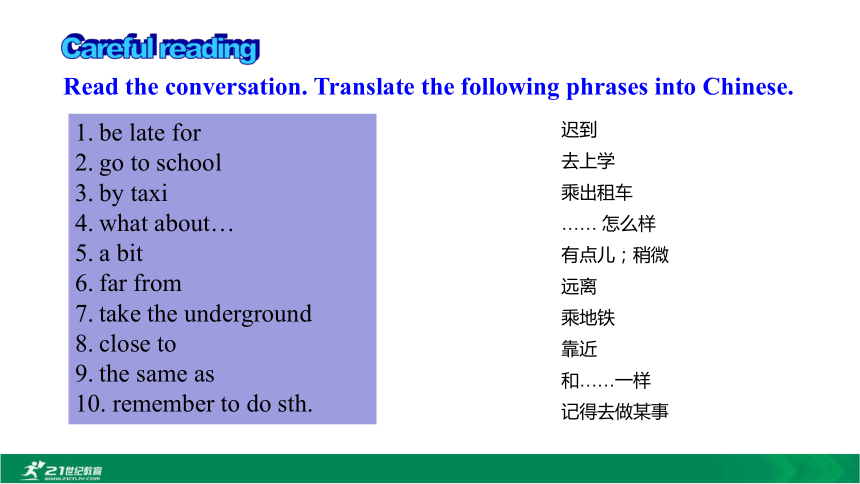
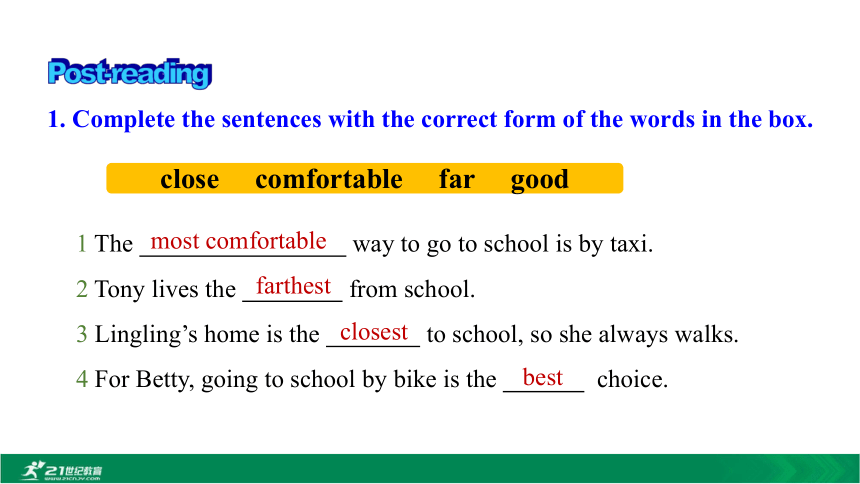
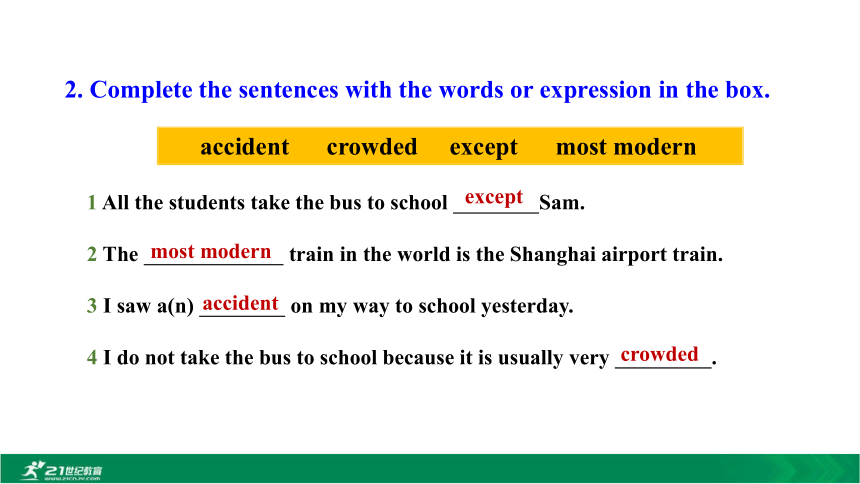
文档简介
2020年秋外研版 八年级上册英语 精品课件
Module 4 Unit 1
Module 4 Planes, ships and trains
Unit 1 He lives the farthest from school.
学 习 目 标
学习本单元新单词及短语: road, accident, except, choice, classmate, far, far from, close, crowded, all the time;
1
3
通过听说训练,了解不同的出行方式及特点,选择适合自己且环保的出行方式。
谈论交通方式;
2
课 堂 导 入
How do you usually go to school?
I walk. My home is close to school.
Well, I live far from school, so I have to take the bus.
Ask and answer
How do you and your classmates go to school?
Why?
Discussion
Listening and vocabulary
Match the words in the box with the pictures.
Warming up
bus ship taxi train underground
Listen and match the words in the box with the pictures in Activity 1.
You need to use one word more than once.
busy cheap expensive modern
Listening
Tapescript:
Boy: Let’s play a game. Question one: What’s the most modern train in the world now?
Girl: Mm… I think it’s the Shanghai airport train.
Boy: Right. Question two: What’s the most expensive way to travel around London?
Girl: Maybe it’s by taxi.
Boy: Correct. Question three: What’s the cheapest way to travel around Beijing?
Girl: The bus.
Boy: Right. And question four: What’s the busiest underground in the world?
Girl: I think it’s the Tokyo underground.
Boy: Yes. Question five: What’s the cheapest way from England to France?
Girl: Mm… Train?
Boy: Sorry, it’s by ship.
Listen and read. Then complete the table.
Fast reading
{5C22544A-7EE6-4342-B048-85BDC9FD1C3A}
Betty
Tony
Lingling
Daming
Ways to go to school
by bus (by bike)
by underground
on foot / walk
by bus
迟到
去上学
乘出租车
…… 怎么样
be late for
go to school
by taxi
what about…
a bit
far from
take the underground
close to
the same as
10. remember to do sth.
有点儿;稍微
远离
乘地铁
靠近
Careful reading
Read the conversation. Translate the following phrases into Chinese.
和……一样
记得去做某事
1. Complete the sentences with the correct form of the words in the box.
close comfortable far good
1 The way to go to school is by taxi.
2 Tony lives the from school.
3 Lingling’s home is the to school, so she always walks.
4 For Betty, going to school by bike is the choice.
most comfortable
farthest
closest
best
Post-reading
2. Complete the sentences with the words or expression in the box.
accident crowded except most modern
1 All the students take the bus to school Sam.
2 The train in the world is the Shanghai airport train.
3 I saw a(n) on my way to school yesterday.
4 I do not take the bus to school because it is usually very .
except
most modern
accident
crowded
Language points
1. I was late for school today. 今天我上学迟到了。
be late for意为“迟到”。
Why was Mr Liu late for the meeting?
胡先生为什么开会迟到了?
Come on. Don’t be late for class.
快点。不要上课迟到。
2. What happened? 发生了什么事?
(1) happen的主语通常是物,表示某事发生。
The accident happened yesterday afternoon.
这个事故发生在昨天下午。
(2) something happens to sb.
表示“某人发生了某事”,通常是指不好的事情。
What happened to him? = What’s wrong with him? = What’s the matter
with him?
他怎么了?
3. There was a road accident, and the traffic was heavy.
路上发生了一起交通事故,交通很拥堵。
(1) accident 名词,意为“交通事故;意外事件”。
What a terrible accident!
多么可怕的一起交通事故啊!
【拓展】
by accident意为“偶然;无意中”。
I took Lingling’s bag home by accident.
我无意间把玲玲的书包拿回了家。
(2) heavy形容词,在这里表示“(在程度、数量等方面)超出一般的,比
一般严重的”,可用来表示交通繁忙或雨雪等很大。
We can hear the noise of the heavy traffic.
我们能听到繁忙的交通的噪音。
The heavy rain stopped us from climbing mountains.
大雨阻止了我们爬山。
【拓展】
heavy还表示“重的;沉的”,与light相对。
This box is heavier than that one.
这个箱子比那个重。
4. But nobody was late, except me.
但除了我之外,没有人迟到。
except介词,意为“除……之外”,后面常接名词、代词或动名词,表示从一个整体中除去部分。
All of them went to the museum except Tony.
除了托尼之外他们都去了博物馆。
I am free every day except today.
除了今天之外我每天都很清闲。
5. Maybe I should go to school by taxi.
或许我应该坐出租车去上学。
(1) maybe副词,意为“或许”,常位于句子开头。
Maybe they are in the library.
或许他们在图书馆。
(2) by taxi意为“乘出租车”。
在英语中表示乘坐某种交通方式通常有以下五种方式:
a. by +交通工具名词 表示方式,在句中作状语,提问时用how。注意名词前不加任何限定词。
My parents go to work by bus.
我父母乘公共汽车去上班。
b. take +a/an/ the +交通工具名词 表示动作,常在句中作谓语。
Daming took the underground to the museum.
大明乘地铁去了博物馆。
c. walk / drive / fly/ ride to +地点名词 表示动作,常在句中作谓语。
I walk to school every day. It’s healthy.
我每天步行去学校,那很健康。
d. in /on +限定词 +交通工具名词 表示状态,在句中作状语。
Dad usually goes to work on his old bike.
爸爸通常骑他的旧自行车去上班。
e. on foot 步行 表示状态,在句中作状语。
Shall we go there on foot or by bike?
我们步行还是骑自行车去那里?
6. He lives the farthest from school, so he takes the underground.
他住得离学校最远,因此他坐地铁。
far from意为“远离”,与close to(离…… 近)意思相对。
Mrs Brown lives far from her company.
布朗夫人住得离她的公司很远。
Their new apartment is close to a supermarket.
他们的新公寓离一家超市很近。
7. He goes by bus too, the same as me. 他 和我一样,也坐公共汽车去。
the same as意为“和……一样”,与different from(与…… 不同)意思相对。
Lucy likes collecting books, the same as her father.
和她父亲一样,露西喜欢收藏书。
Their school is different from ours.
他们的学校和我们的学校不同。
【拓展】
the same… as表示“和……一样……”。
My sister always wears the same clothes as me.
我妹妹总是穿和我一样的衣服。
Pronunciation and speaking
Listen and underline the words the speaker stresses.
1 -Who lives the closest to school?
-Lingling lives the closest.
2 -What is the most comfortable way to go to school for Betty?
-By taxi.
Now work in pairs. Listen again and repeat.
Work in pairs. Ask and answer questions about the ways of going
to school. Use the words in the box to help you.
bike bus cheap comfortable crowded expensive
fast popular safe taxi underground walking
--- What’s the most expensive way to go to school?
--- Going by taxi is the most expensive.
I. 短语翻译
1、远离 2、一直;不断地
3、靠近 4、 迟到
5、乘公共汽车 6、有点;稍微
7、去上学 8、骑自行车
9、和……一样 10、……怎么样
far from
close to
by bus / take the bus
go to school
all the time
be late for
a bit / a little
ride a bike
课 堂 达 标
the same as
how about…
II.单项填空
--- Would you like to go swimming with us?
--- What a pity! I am free every day _____ today.
A. without B. on C. except D. from
2. --- Lingling looked sad. _______?
--- She lost her favourite watch.
A. What about you B. What happened
C. Who else D. Why not
3. Lily lives far from her school. She goes to school _____ underground every day.
A. by B. in C. takes D. by the
4. My home is close to the park. ______ I will walk there.
A. Because B. But C. Or D. So
C
B
A
D
1. Tony, remember ___________ (bring) your homework to school tomorrow morning.
2. It is hot. What about ________ (go) swimming?
3. It’s raining heavily. So be ________ (care) when you are driving.
4. Which is ____________________ (comfortable) way to go to school, by bus, by bike or by underground?
5. That is a good ________(choose). Do you all agree?
III. 用所给单词的适当形式填空
to bring
going
careful
the most comfortable
choice
1. 为什么大明一直站在门口?
Why is Daming standing at the door ______ _____ _______?
2. 不要吃如此多的肉,对你的身体有害。
______ ______ ______ ______ meat. It’s bad for your health.
3. 刚才她有点儿生自己女儿的气。
She was ______ ______ angry with her daughter just now.
4. 我们的新学校离城市中心很远。
Our new school is ______ ______ the city centre.
5. 我表姐每周六上午去图书馆,和我一样。
My cousin goes to the library every Saturday morning,
______ ______ ______ me.
IV.根据汉语意思完成句子(每空一词)
all the time
a bit
Don’t eat so much
far from
the same as
1. Read the conversation.
2. Talk with your partner about ways to go
to school.
Homework
谢谢
21世纪教育网(www.21cnjy.com) 中小学教育资源网站
有大把高质量资料?一线教师?一线教研员?
欢迎加入21世纪教育网教师合作团队!!月薪过万不是梦!!
详情请看:
https://www.21cnjy.com/help/help_extract.php
Module 4 Unit 1
Module 4 Planes, ships and trains
Unit 1 He lives the farthest from school.
学 习 目 标
学习本单元新单词及短语: road, accident, except, choice, classmate, far, far from, close, crowded, all the time;
1
3
通过听说训练,了解不同的出行方式及特点,选择适合自己且环保的出行方式。
谈论交通方式;
2
课 堂 导 入
How do you usually go to school?
I walk. My home is close to school.
Well, I live far from school, so I have to take the bus.
Ask and answer
How do you and your classmates go to school?
Why?
Discussion
Listening and vocabulary
Match the words in the box with the pictures.
Warming up
bus ship taxi train underground
Listen and match the words in the box with the pictures in Activity 1.
You need to use one word more than once.
busy cheap expensive modern
Listening
Tapescript:
Boy: Let’s play a game. Question one: What’s the most modern train in the world now?
Girl: Mm… I think it’s the Shanghai airport train.
Boy: Right. Question two: What’s the most expensive way to travel around London?
Girl: Maybe it’s by taxi.
Boy: Correct. Question three: What’s the cheapest way to travel around Beijing?
Girl: The bus.
Boy: Right. And question four: What’s the busiest underground in the world?
Girl: I think it’s the Tokyo underground.
Boy: Yes. Question five: What’s the cheapest way from England to France?
Girl: Mm… Train?
Boy: Sorry, it’s by ship.
Listen and read. Then complete the table.
Fast reading
{5C22544A-7EE6-4342-B048-85BDC9FD1C3A}
Betty
Tony
Lingling
Daming
Ways to go to school
by bus (by bike)
by underground
on foot / walk
by bus
迟到
去上学
乘出租车
…… 怎么样
be late for
go to school
by taxi
what about…
a bit
far from
take the underground
close to
the same as
10. remember to do sth.
有点儿;稍微
远离
乘地铁
靠近
Careful reading
Read the conversation. Translate the following phrases into Chinese.
和……一样
记得去做某事
1. Complete the sentences with the correct form of the words in the box.
close comfortable far good
1 The way to go to school is by taxi.
2 Tony lives the from school.
3 Lingling’s home is the to school, so she always walks.
4 For Betty, going to school by bike is the choice.
most comfortable
farthest
closest
best
Post-reading
2. Complete the sentences with the words or expression in the box.
accident crowded except most modern
1 All the students take the bus to school Sam.
2 The train in the world is the Shanghai airport train.
3 I saw a(n) on my way to school yesterday.
4 I do not take the bus to school because it is usually very .
except
most modern
accident
crowded
Language points
1. I was late for school today. 今天我上学迟到了。
be late for意为“迟到”。
Why was Mr Liu late for the meeting?
胡先生为什么开会迟到了?
Come on. Don’t be late for class.
快点。不要上课迟到。
2. What happened? 发生了什么事?
(1) happen的主语通常是物,表示某事发生。
The accident happened yesterday afternoon.
这个事故发生在昨天下午。
(2) something happens to sb.
表示“某人发生了某事”,通常是指不好的事情。
What happened to him? = What’s wrong with him? = What’s the matter
with him?
他怎么了?
3. There was a road accident, and the traffic was heavy.
路上发生了一起交通事故,交通很拥堵。
(1) accident 名词,意为“交通事故;意外事件”。
What a terrible accident!
多么可怕的一起交通事故啊!
【拓展】
by accident意为“偶然;无意中”。
I took Lingling’s bag home by accident.
我无意间把玲玲的书包拿回了家。
(2) heavy形容词,在这里表示“(在程度、数量等方面)超出一般的,比
一般严重的”,可用来表示交通繁忙或雨雪等很大。
We can hear the noise of the heavy traffic.
我们能听到繁忙的交通的噪音。
The heavy rain stopped us from climbing mountains.
大雨阻止了我们爬山。
【拓展】
heavy还表示“重的;沉的”,与light相对。
This box is heavier than that one.
这个箱子比那个重。
4. But nobody was late, except me.
但除了我之外,没有人迟到。
except介词,意为“除……之外”,后面常接名词、代词或动名词,表示从一个整体中除去部分。
All of them went to the museum except Tony.
除了托尼之外他们都去了博物馆。
I am free every day except today.
除了今天之外我每天都很清闲。
5. Maybe I should go to school by taxi.
或许我应该坐出租车去上学。
(1) maybe副词,意为“或许”,常位于句子开头。
Maybe they are in the library.
或许他们在图书馆。
(2) by taxi意为“乘出租车”。
在英语中表示乘坐某种交通方式通常有以下五种方式:
a. by +交通工具名词 表示方式,在句中作状语,提问时用how。注意名词前不加任何限定词。
My parents go to work by bus.
我父母乘公共汽车去上班。
b. take +a/an/ the +交通工具名词 表示动作,常在句中作谓语。
Daming took the underground to the museum.
大明乘地铁去了博物馆。
c. walk / drive / fly/ ride to +地点名词 表示动作,常在句中作谓语。
I walk to school every day. It’s healthy.
我每天步行去学校,那很健康。
d. in /on +限定词 +交通工具名词 表示状态,在句中作状语。
Dad usually goes to work on his old bike.
爸爸通常骑他的旧自行车去上班。
e. on foot 步行 表示状态,在句中作状语。
Shall we go there on foot or by bike?
我们步行还是骑自行车去那里?
6. He lives the farthest from school, so he takes the underground.
他住得离学校最远,因此他坐地铁。
far from意为“远离”,与close to(离…… 近)意思相对。
Mrs Brown lives far from her company.
布朗夫人住得离她的公司很远。
Their new apartment is close to a supermarket.
他们的新公寓离一家超市很近。
7. He goes by bus too, the same as me. 他 和我一样,也坐公共汽车去。
the same as意为“和……一样”,与different from(与…… 不同)意思相对。
Lucy likes collecting books, the same as her father.
和她父亲一样,露西喜欢收藏书。
Their school is different from ours.
他们的学校和我们的学校不同。
【拓展】
the same… as表示“和……一样……”。
My sister always wears the same clothes as me.
我妹妹总是穿和我一样的衣服。
Pronunciation and speaking
Listen and underline the words the speaker stresses.
1 -Who lives the closest to school?
-Lingling lives the closest.
2 -What is the most comfortable way to go to school for Betty?
-By taxi.
Now work in pairs. Listen again and repeat.
Work in pairs. Ask and answer questions about the ways of going
to school. Use the words in the box to help you.
bike bus cheap comfortable crowded expensive
fast popular safe taxi underground walking
--- What’s the most expensive way to go to school?
--- Going by taxi is the most expensive.
I. 短语翻译
1、远离 2、一直;不断地
3、靠近 4、 迟到
5、乘公共汽车 6、有点;稍微
7、去上学 8、骑自行车
9、和……一样 10、……怎么样
far from
close to
by bus / take the bus
go to school
all the time
be late for
a bit / a little
ride a bike
课 堂 达 标
the same as
how about…
II.单项填空
--- Would you like to go swimming with us?
--- What a pity! I am free every day _____ today.
A. without B. on C. except D. from
2. --- Lingling looked sad. _______?
--- She lost her favourite watch.
A. What about you B. What happened
C. Who else D. Why not
3. Lily lives far from her school. She goes to school _____ underground every day.
A. by B. in C. takes D. by the
4. My home is close to the park. ______ I will walk there.
A. Because B. But C. Or D. So
C
B
A
D
1. Tony, remember ___________ (bring) your homework to school tomorrow morning.
2. It is hot. What about ________ (go) swimming?
3. It’s raining heavily. So be ________ (care) when you are driving.
4. Which is ____________________ (comfortable) way to go to school, by bus, by bike or by underground?
5. That is a good ________(choose). Do you all agree?
III. 用所给单词的适当形式填空
to bring
going
careful
the most comfortable
choice
1. 为什么大明一直站在门口?
Why is Daming standing at the door ______ _____ _______?
2. 不要吃如此多的肉,对你的身体有害。
______ ______ ______ ______ meat. It’s bad for your health.
3. 刚才她有点儿生自己女儿的气。
She was ______ ______ angry with her daughter just now.
4. 我们的新学校离城市中心很远。
Our new school is ______ ______ the city centre.
5. 我表姐每周六上午去图书馆,和我一样。
My cousin goes to the library every Saturday morning,
______ ______ ______ me.
IV.根据汉语意思完成句子(每空一词)
all the time
a bit
Don’t eat so much
far from
the same as
1. Read the conversation.
2. Talk with your partner about ways to go
to school.
Homework
谢谢
21世纪教育网(www.21cnjy.com) 中小学教育资源网站
有大把高质量资料?一线教师?一线教研员?
欢迎加入21世纪教育网教师合作团队!!月薪过万不是梦!!
详情请看:
https://www.21cnjy.com/help/help_extract.php
同课章节目录
- Module 1 How to learn English
- Unit 1 Let's try to speak English as much as possi
- Unit 2 You should smile at her.
- Unit 3 Language in use .
- Module 2 My home town and my country
- Unit 1 It's taller than many other buildings.
- Unit 2 Cambridge is a beautiful city in the east o
- Unit 3 Language in use .
- Module 3 Sports.
- Unit 1 Nothing is more exciting than playing tenni
- Unit 2 This year we training more carefully.
- Unit 3 Language in use .
- Module 4 Planes, ships and trains .
- Unit 1 He lives the farthest from school.
- Unit 2 What is the best way to travel.
- Unit 3 Language in use .
- Module 5 Lao She Teahouse.
- Unit 1 I wanted to see the Beijing Opera.
- Unit 2 It descibes the changes in Chinese society.
- Unit 3 Language in use .
- Module 6 Animals in danger.
- Unit 1 It allows people to get closer to them .
- Unit 2 The WWF is working hard to save them all.
- Unit 3 Language in use .
- Revision module A
- Module 7 A famous story
- Unit 1 Alice was sitting with her sister by the ri
- Unit 2 She was thinking about her cat.
- Unit 3 Language in use .
- Module 8 Accidents
- Unit 1 While the car were changing to red, a car s
- Unit 2 I was trying to pick it up when it bite me
- Unit 3 Language in use .
- Module 9 Population
- Unit 1 The population of China is about 1.37 billi
- Unit 2 Arnwick was a city with 200,000 people.
- Unit 3 Language in use .
- Module 10 The weathe
- Unit 1 It might snow.
- Unit 2 The weather is fine all year round.
- Unit 3 Language in use .
- Module 11 Way of life
- Unit 1 In China ,we open a gift later.
- Unit 2 In England, you usually drink tea with milk
- Unit 3 Language in use .
- Module 12 Help
- Unit 1 What should we do before help arrives?
- Unit 2 Stay away from windows and heavy furniture.
- Unit 3 Language in use .
- Revision module B
